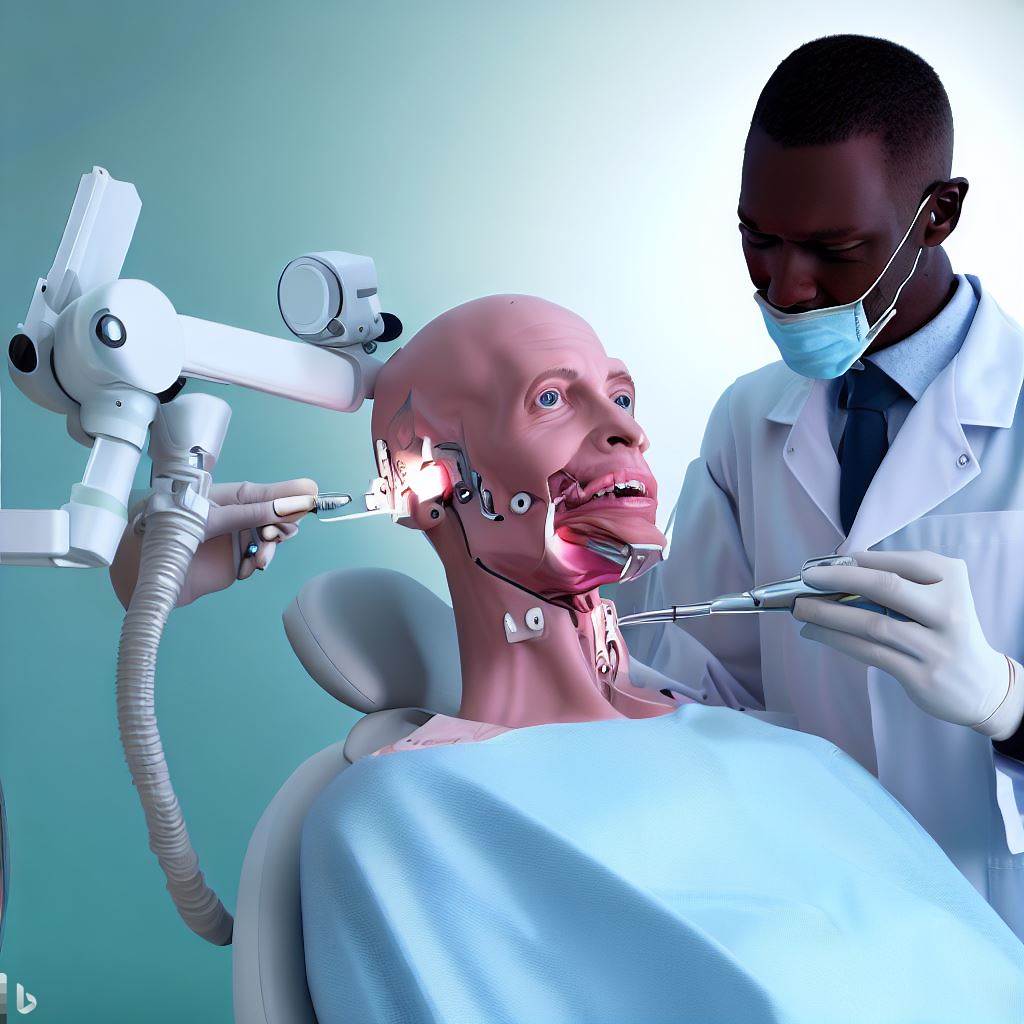Introduction
Dentistry plays a crucial role in healthcare as it focuses on oral health and the prevention of dental diseases.
If you’re interested in pursuing a career in dentistry in Nigeria, it is crucial to understand the educational path that leads to becoming a dentist. In this article, we will explore the exciting journey that aspiring dentists embark on to contribute to oral health and overall well-being in the country.
We will delve into the diverse career specializations available within dentistry, allowing professionals to specialize and excel in specific areas of oral health.
Additionally, we will shed light on the essential role of professional bodies in supporting dental practitioners, ensuring ethical standards, and advancing the practice of dentistry.
The Educational Path to Dentistry in Nigeria
In Nigeria, the educational path to becoming a dentist requires several years of rigorous training and specialized education.
It begins with obtaining a Bachelor of Dental Surgery (BDS) degree from a recognized university. This undergraduate program typically lasts for five years and includes both theoretical classroom education and practical clinical training.
After completing the BDS degree, graduates must undergo a one-year mandatory internship program in a teaching hospital to gain practical experience. This internship is a crucial step in preparing future dentists for professional practice.
Following the internship, graduates are required to pass the Dental Therapist Registration Examination (DTRE) conducted by the Medical and Dental Council of Nigeria (MDCN). This examination is essential for obtaining a license to practice dentistry in the country.
Once licensed, dentists can choose to pursue further specialization by enrolling in a residency program. Specializations include orthodontics, periodontics, endodontics, oral and maxillofacial surgery, and pediatric dentistry.
Residency programs typically last for three to four years, depending on the chosen specialization. Throughout their educational journey, aspiring dentists are trained in various aspects of oral healthcare, including dental anatomy, oral pathology, dental radiology, and dental restorations.
They also gain hands-on experience through clinical rotations and community outreach programs.
By completing this rigorous educational path, dentists in Nigeria acquire the knowledge and skills necessary to provide quality oral healthcare to the population and contribute to the overall well-being of the community.
Pre-university Requirements
To pursue a career in dentistry in Nigeria, there are certain pre-university requirements that aspiring dentists must fulfill. These requirements include:
General subjects required for dentistry in Nigeria:
- English Language
- Mathematics
- Chemistry
- Biology
- Physics
These subjects are crucial for the study of dentistry as they provide the foundation for understanding the fundamental principles of the field. Each subject plays a specific role in building the necessary knowledge and skills required for a successful dental career.
Importance of securing good grades in these subjects
Securing good grades in the general subjects required for dentistry is of utmost importance for several reasons:
- University Admission: To gain admission to a dental school in Nigeria, candidates are typically required to meet certain GPA cutoffs.
Good grades in pre-university subjects increase the chances of securing a place in a reputable dental school. - Competitive Advantage: Dentistry is a highly competitive field, and good grades can provide an edge over other applicants during the admission process.
Admissions committees often consider academic performance as an indicator of a candidate’s potential for success in dental studies. - Foundation for Success: The subjects required for dentistry form the building blocks for advanced dental courses.
Strong foundational knowledge facilitates understanding and mastery of more complex dental concepts in the future.
Overview of common pre-university exams (e.g., JAMB, WAEC, NECO)
In Nigeria, several pre-university exams are commonly accepted for admission into dental schools. These exams include:
- JAMB (Joint Admissions and Matriculation Board) Exam: JAMB is a national standardized exam required for admission into Nigerian universities.
The exam assesses candidates’ knowledge in subjects such as English, Mathematics, Physics, Chemistry, and Biology. - WAEC (West African Examinations Council) Exam: WAEC is a regional examination board that conducts exams in English-speaking West African countries.
It includes subjects like English, Mathematics, Physics, Chemistry, and Biology. - NECO (National Examinations Council) Exam: NECO is another national examination body that conducts exams in Nigeria.
It assesses candidates in subjects including English, Mathematics, Physics, Chemistry, and Biology.
These exams typically assess candidates’ knowledge and understanding of the required subjects and serve as a basis for university admissions. Good performance in these exams is crucial for aspiring dentists to secure a spot in a reputable dental school in Nigeria.
In essence, aspiring dentists in Nigeria must fulfill specific pre-university requirements, including the general subjects required for dentistry.
Securing good grades in these subjects is essential and provides advantages during university admissions. By meeting these requirements and performing well in the exams, aspiring dentists can pave the way for a successful educational path towards dentistry in Nigeria.
Read: Challenges Faced by Dentists in Nigeria
Undergraduate Education in Dentistry in Nigeria
Obtaining a bachelor’s degree in dentistry is crucial for individuals aspiring to become dentists in Nigeria.
This blog section will provide insights into the undergraduate educational path to dentistry in Nigeria, including the importance of a bachelor’s degree, universities offering dentistry programs, entrance requirements, and the duration and structure of the programs.
Importance of a Bachelor’s Degree in Dentistry
A bachelor’s degree in dentistry is a prerequisite for individuals aiming to pursue a career in dentistry. It provides students with a strong foundation in the basic sciences and dental-related subjects.
Obtaining a bachelor’s degree also helps students develop crucial skills such as critical thinking and problem-solving. Additionally, it prepares students for further specialization and advanced education in dentistry.
Here are some other reasons why a bachelor’s degree in dentistry is important:
- Prerequisite for Dental School: Most dental schools in Nigeria and around the world require applicants to have a bachelor’s degree in dentistry or related fields. It serves as an entry requirement for dental programs, and without it, individuals cannot proceed to dental school.
- Strong Foundation in Sciences: During the bachelor’s degree, students delve into various science subjects, including biology, chemistry, and anatomy. This foundational knowledge is essential for understanding oral health, dental diseases, and dental treatments.
- Dental-Related Subjects: Alongside basic sciences, the curriculum covers dental-related subjects, such as oral pathology, dental materials, and oral radiology. These courses provide specific insights into the field of dentistry.
- Skill Development: Pursuing a bachelor’s degree in dentistry helps students develop critical skills like problem-solving, decision-making, and effective communication. These skills are crucial for success as a dentist and in any healthcare-related profession.
- Specialization Opportunities: While a bachelor’s degree is not specialized, it sets the stage for further specialization in dentistry. After completing the degree, individuals can choose specific areas like orthodontics, endodontics, or pediatric dentistry for advanced study and practice.
- Exposure to Dental Environment: Throughout the program, students may have the opportunity to engage in practical experiences, internships, or clinical rotations in dental settings. This exposure offers valuable insights into the dental profession and helps students confirm their career choice.
Overview of Universities in Nigeria Offering Dentistry Programs
Nigeria boasts various top-tier schools that offer dentistry. Here are some of the most reputable universities in Nigeria with excellent dentistry programs.
- University of Lagos
- University of Ibadan
- University of Benin
- Obafemi Awolowo University, Ile-Ife
- Ahmadu Bello University, Zaria
Entrance Requirements for Dentistry Programs
Prospective students must have a minimum of five credits in science subjects, including Chemistry, Biology, and Physics. They are required to sit for and pass the Unified Tertiary Matriculation Examination (UTME). A high UTME score is vital for securing admission into dentistry programs.
Some universities may conduct additional entrance examinations or interviews as part of the selection process.
Duration and Structure of Dentistry Programs
Dentistry programs in Nigeria typically last for a duration of five to six years. These programs consist of both theoretical classroom instruction and practical clinical training.
Students undertake various dental rotations and gain hands-on experience in different dental specialties. They are also required to complete a research project or dissertation during their final year of study.
Hence, pursuing a bachelor’s degree in dentistry is crucial for individuals aspiring to become dentists in Nigeria.
Universities such as the University of Lagos, University of Ibadan, University of Benin, Obafemi Awolowo University, and Ahmadu Bello University offer dentistry programs.
Prospective students must meet the entrance requirements and successfully complete the five to six-year dentistry program, which includes theoretical instruction, clinical training, dental rotations, and a research project.
By garnering a solid undergraduate education, aspiring dentists can pave the way for a successful career in oral healthcare.
Read: Dietitian vs Nutritionist: Distinctions in the Nigerian Context
Dental School Curriculum
In Nigeria, the educational path to dentistry involves a comprehensive curriculum that covers a range of courses, emphasizes practical experience and clinical rotations, offers specializations, and provides research opportunities.
Overview of Courses Covered in Dental School
Dental school in Nigeria typically covers a wide range of courses that are essential for a well-rounded education in dentistry. These courses include:
- Anatomy and physiology
- Biochemistry
- Oral Pathology
- Oral biology
- Pharmacology
- Restorative dentistry
- Oral surgery
- Orthodontics
- Periodontics
- Endodontics
- Prosthodontics
By covering these courses, dental students gain a solid foundation of knowledge in various aspects of dental health and treatment.
Importance of Practical Experience and Clinical Rotations
In addition to theoretical courses, practical experience, and clinical rotations are integral components of the dental school curriculum in Nigeria.
Through hands-on training and exposure to real patient cases, students develop the necessary skills and confidence to apply their knowledge effectively in a clinical setting.
During clinical rotations, students work under the guidance of experienced dental professionals and are involved in patient diagnosis, treatment planning, and execution of dental procedures. This practical experience enhances their understanding of dental practice and prepares them for their future careers.
Specializations Available in Dentistry
After completing the core curriculum, dental students in Nigeria have the opportunity to specialize in a specific area of dentistry. These specializations include:
- Orthodontics – focusing on teeth and jaw alignment
- Endodontics – specializing in root canal therapy
- Periodontics – dealing with gum diseases and surgical interventions
- Oral and Maxillofacial Surgery – involving complex dental and facial surgeries
- Prosthodontics – focusing on the design and fitting of dental prostheses
Specializing allows dentists to develop expertise in a specific area and provide specialized care to their patients.
Introduction to Research Opportunities in Dentistry
Research is a significant aspect of dentistry that allows for advancements in dental treatments and techniques. Dental schools in Nigeria encourage students to engage in research activities to broaden their knowledge and contribute to the field.
Research opportunities in dentistry include conducting studies on new materials, exploring innovative treatment approaches, and participating in dental public health research.
Through research, dental students can enhance their critical thinking skills, stay updated with the latest advancements, and make meaningful contributions to the dental community.
Essentially, the educational path to dentistry in Nigeria encompasses a comprehensive curriculum, practical experience through clinical rotations, specialization opportunities, and research possibilities.
This holistic approach ensures that dental students develop the necessary skills, knowledge, and expertise to provide quality dental care to the Nigerian population.
Read: Unveiling the Salary Structure of Dietitians in Nigeria
Clinical Practice and Internship
Compulsory clinical practice and internship programs are integral parts of dental education in Nigeria. These programs provide aspiring dentists with hands-on experience in real clinical settings.
Hands-on experience is crucial in developing the necessary skills and confidence to practice dentistry. During clinical practice and internship, students have the opportunity to work under the guidance of experienced dental professionals.
This exposure helps students understand the practical aspects of dentistry and apply their theoretical knowledge. Completing clinical practice and internship programs is a requirement for obtaining a dental license in Nigeria.
These programs ensure that aspiring dentists have the practical skills needed to provide quality dental care. After completing their clinical practice and internship, students can apply for a license to practice dentistry in Nigeria.
Licensing Requirements for Dentists in Nigeria
To become a licensed dentist in Nigeria, individuals must meet certain requirements set by the Dental Council of Nigeria. These requirements include completing a recognized dental degree program and passing the licensing examination.
The licensing examination assesses the candidate’s knowledge and skills in various aspects of dentistry. Once the licensing requirements are met, dentists can register with the Dental Council of Nigeria.
Registration allows dentists to legally practice dentistry and be recognized as dental professionals in Nigeria. Continuing education is also a requirement for maintaining a dental license in Nigeria.
Dentists must participate in regular professional development activities to stay updated with the latest advancements in dentistry.
Professional Dental Organizations in Nigeria
There are several professional dental organizations in Nigeria that provide support and resources for dentists. The Nigerian Dental Association (NDA) is the primary professional organization for dentists in the country. The NDA aims to promote oral health and the professional development of dentists in Nigeria.
It organizes conferences, workshops, and seminars to enhance dental education and promote research in the field. Other professional dental organizations in Nigeria include the Nigerian Association of Dental Students (NADS) and the Nigerian Association of Orthodontists (NAO).
These organizations provide platforms for networking, collaboration, and knowledge sharing among dental professionals and students. Being a member of these organizations offers opportunities for professional growth and access to valuable resources and research.
In essence, clinical practice and internship programs, licensing requirements, and professional dental organizations play essential roles in the educational path to dentistry in Nigeria.
The hands-on experience gained through clinical practice and internship programs prepares aspiring dentists for real-world challenges. Meeting the licensing requirements ensures that dentists possess the necessary skills and knowledge to provide quality dental care.
Moreover, professional dental organizations provide support, resources, and networking opportunities for dentists in Nigeria. These aspects collectively contribute to the development and success of dental professionals in the country.
Read: Evaluating the Impact of Dietitians on Nigerian Healthcare

Postgraduate Education and Specializations in Dentistry in Nigeria
In the field of dentistry, pursuing postgraduate education is of utmost importance as it allows dentists to acquire advanced knowledge and skills, ensuring their expertise in specific areas.
Nigeria offers a range of postgraduate programs and specializations, opening up numerous career opportunities for dentists.
Importance of Pursuing Postgraduate Education in Dentistry
- Enhancing knowledge and skills: Postgraduate education provides dentists with the opportunity to expand their knowledge and develop advanced clinical skills.
- Specialization in specific areas: Dentists can choose to specialize in various areas such as orthodontics, periodontology, oral and maxillofacial surgery, prosthodontics, and more through postgraduate education.
- Keeping up with advancements: Dentistry is a constantly evolving field, and pursuing postgraduate education ensures dentists stay updated with the latest advancements and techniques.
- Increased career opportunities: Dentists with postgraduate qualifications have better chances of securing high-paying positions and advancements in their careers.
- Providing quality patient care: Postgraduate education equips dentists with the necessary skills to provide specialized and comprehensive dental care to their patients.
Overview of Available Postgraduate Programs in Nigeria
- Master of Dental Surgery (MDS): This is a specialized program that offers in-depth knowledge and training in various dental specialties.
- Doctor of Philosophy (Ph.D.): Dentists can pursue a Ph.D. in Dentistry, focusing on research and academia.
- Master of Science (M.Sc.): The M.Sc. programs in Dentistry provide advanced theoretical and practical training in specific areas.
- Postgraduate Diploma (PGD): PGD programs offer specialized training for dentists who want to enhance their skills in a particular area without completing a full master’s program.
Specializations and Advanced Training Options for Dentists
- Orthodontics: Dentists specializing in orthodontics focus on correcting misaligned teeth and jaws.
- Periodontology: This specialization deals with the prevention, diagnosis, and treatment of gum diseases.
- Oral and Maxillofacial Surgery: Dentists who specialize in this field perform surgeries related to the mouth, jaws, and face.
- Prosthodontics: Prosthodontists specialize in the restoration and replacement of missing teeth.
- Endodontics: Dentists specializing in endodontics focus on treating diseases and injuries of the dental pulp.
Career Opportunities and Potential for Specialization
- Teaching and research positions in dental schools and universities.
- Private practice with specialized services catering to specific dental needs.
- Employment in hospitals, clinics, and public health organizations.
- Consultancy roles, providing expert advice in dental treatment planning and specialized procedures.
- Opportunities for further specialization and continuous professional development.
In general, postgraduate education in dentistry in Nigeria plays a vital role in enhancing the skills and knowledge of dentists.
It offers a wide range of specializations, opening up various career opportunities in academia, research, private practice, and public health.
Dentists who pursue postgraduate education ensure the provision of specialized and quality dental care, keeping up with advancements in the field.
Read: How to Become a Diagnostic Medical Sonographer in Nigeria
Discover More: Pediatric Healthcare: How Nigeria Compares Globally
Uncover the Details: Mental Health Support for Nursing Assistants in Nigeria
Challenges and Rewards for Dentistry in Nigeria
Challenges Faced during the Educational Path to Dentistry in Nigeria
- A limited number of dental schools, resulting in intense competition for admission.
- Insufficient infrastructure and outdated dental equipment in some dental schools.
- High cost of dental education, making it inaccessible for many aspiring dentists.
- Inadequate exposure to practical clinical experiences during dental training.
- Limited availability of experienced dental faculty, leading to a lack of mentorship and guidance.
- Language barrier for non-native English speakers during dental education in Nigeria.
Rewards and Satisfaction in the Field
- The opportunity to improve people’s oral health and overall well-being.
- A sense of fulfillment from relieving patients’ dental pain and restoring their smiles.
- The ability to educate patients about preventive oral care and make a lasting impact on their lives.
- Personal and professional growth through continuous learning and refinement of dental skills.
- Financial stability and the potential to build a successful dental practice with a steady income.
- Recognition and respect in the community as a healthcare professional.
Importance of Continuous Education and Staying Updated
Dental technology and treatment techniques constantly evolve, requiring dentists to stay updated. Continuous education ensures dentists provide high-quality care and remain competent in their field.
Dentists must stay informed about new research and advancements to offer the best treatment options. Continuous learning allows dentists to expand their services and provide specialized treatments.
Staying updated enhances patient trust and confidence in the dentist’s abilities. Continuing education provides opportunities for networking with other dental professionals and fostering professional relationships.
In fact, the educational path to dentistry in Nigeria presents several challenges, including limited opportunities, financial constraints, and inadequate resources.
However, the rewards and satisfaction gained in the field are significant, ranging from improving patients’ oral health to enjoying financial stability. Continuous education is crucial to stay updated and provide quality care to patients while fostering personal and professional growth.
Conclusion
To recap, the educational path to dentistry in Nigeria starts with obtaining a Bachelor’s degree in Dentistry from a recognized Nigerian university.
This is followed by a compulsory one-year internship program in a teaching dental hospital. After completing the internship, dentists are required to pass the Dental Surgery Primary Examination conducted by the West African College of Surgeons.
They then proceed to specialist training, where they acquire advanced skills in areas such as orthodontics, periodontology, or oral surgery.
The importance of dentistry in Nigeria cannot be overstated. It plays a vital role in promoting oral health and overall well-being.
With the rising awareness of the significance of oral hygiene, the demand for dental services is expected to increase, creating opportunities for growth within the field.
As Nigeria’s population continues to grow, the need for qualified dentists will also rise. Addressing the oral health challenges faced by the country requires a well-trained and competent dental workforce to provide quality care to the population.
In conclusion, dentistry in Nigeria offers a promising career path with ample opportunities for growth and development.
As the healthcare sector continues to evolve, dentists are essential in ensuring the oral health and overall well-being of Nigerians. Investing in the education and training of dental professionals is crucial for the future of dentistry in the country.




